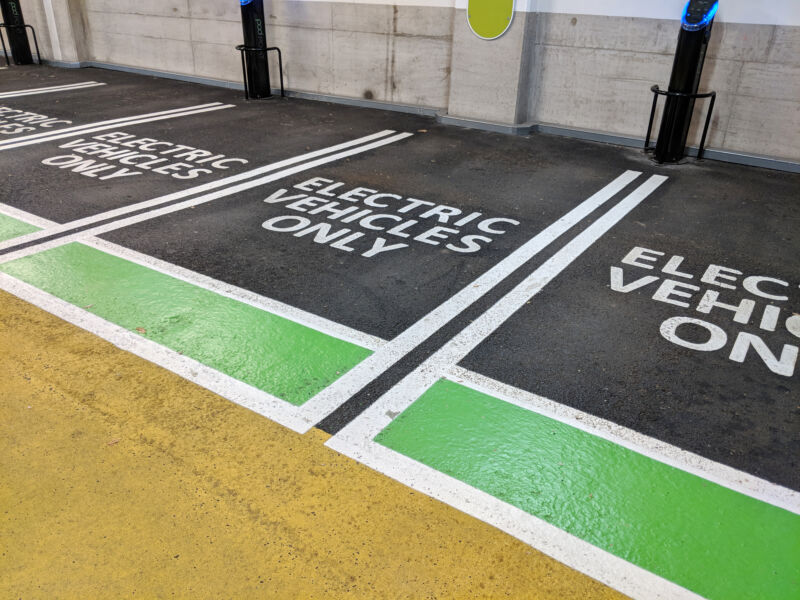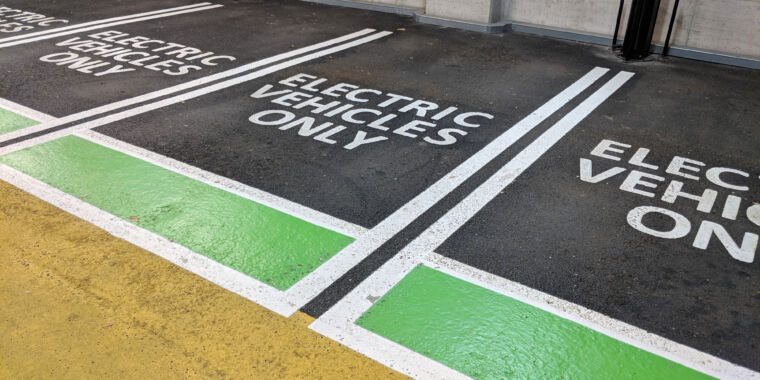Car dealers step up opposition to White House fuel efficiency targets

Richard Newstead/Getty Images
Electric vehicle sales had a pretty good 2023 in North America, with more than 1.1 million battery EVs and just under 300,000 plug-in hybrid EVs finding new homes. That’s a 50 percent increase on 2022, yet the last few months have seen the trade and business presses report a string of negative stories about EV adoption. And it’s not just news stories—major automakers are scaling back their EV ambitions, and together with auto dealerships, they’re lobbying the White House to water down its plan to reduce transportation-related carbon emissions.
While US car buyers are still choosing EVs in greater numbers, the rate of increase is beginning to slow. According to a report from S&P Global, EV registrations grew by 23 percent in December, faster than the general increase in new light vehicle sales (15 percent year over year). But market leaders did not do so well. Tesla only grew sales by 11 percent; at Ford, they rose by 13 percent. Chevrolet saw EV sales drop by 26 percent as it finally exhausted its supply of the low-cost Bolt EV.
Car buyers’ concerns
Similarly, a survey from Deloitte provides a little more pessimism when it comes to EV adoption. It has found that only 6 percent of buyers are now considering a battery EV, down from 7 percent in 2023. Demand for plug-in hybrids has also fallen, from 7 percent in 2023 to 5 percent in 2024. Instead, more buyers want gasoline- or diesel-powered vehicles, a full two-thirds in 2024 compared to 58 percent last year.
The high cost of new plug-in vehicles doesn’t help, despite government subsidies in the form of a tax credit. Deloitte’s data shows that among people intending to buy an EV, 74 percent of them want to pay $50,000 or less.
“Despite availability of government incentives, the rise in interest rates is adding stress to people’s wallets,” said Masa Hasegawa, Deloitte’s principal for the US automotive sector. “In addition to affordability, our study shows that there are several key apprehensions consumers still have about purchasing and owning BEVs, such as the consistency and reliability of charging experience and range anxiety. This will evolve over time, but they remain at the top of mind for many consumers today.”
Misinformation abounds
Some of those apprehensions are well-founded; 40 percent cite a lack of home charging, for instance, and half are concerned about the time it takes to recharge an EV. Range anxiety continues to be a problem, too; 49 percent worried about driving range, one in three worried about cold-weather performance, and 28 percent were concerned about trips requiring more advanced planning than they were used to.
However, some other concerns suggest a real lack of knowledge among the general public regarding some aspects of EVs. Sixty-nine percent of people intending to buy an EV were somewhat or very concerned about the end-to-end environmental impact of an EV—higher than the 56 percent of people who intend their next car to have an internal combustion engine.
While it is correct that an EV requires more energy to build, an electric powertrain is so much more efficient than even the best hybrid powertrains that it only requires a few years of driving for the EV to come out ahead.
There are some unrealistic expectations out there, too. Forty-six percent of Deloitte’s survey respondents said they would need an EV with at least 400 miles of range before they’d consider purchasing one, a proportion that grew to 60 percent when just taking into account those living in suburban and rural areas. While battery energy density and EV powertrain efficiency both continue to improve, currently only Lucid sells an EV with more than 500 miles of range, while Tesla claims its Model S has a 405-mile range (something Tesla owners might dispute.)
Car dealers step up opposition to White House fuel efficiency targets Read More »
